Kilogram in Math: Definition, Examples, and Practice Math Problems
reviewed by Jo-ann Caballes
Updated on October 8, 2024
A kilogram is a system of measurement used to determine the amount of mass an object contains.
This article covers kilograms in math definition, examples of kilograms, helps you understand how big a kilogram is, and more. Happy learning!
Definition of Kilogram in Math
A kilogram is a system of measurement used to calculate the weight of an object(s).
The Kilogram is the standard base unit of mass as recognized by the International System of Units (SI). This is due to the development of the metric system which found that many measured masses were much larger than a gram and could be measured as kilograms.
“Kilo” is derived from a Greek word that means ‘thousand’, and “gram” is from a Latin word that means “small weight”.
Kilogram in math is identifiable by the symbol “kg”.
Kilogram Measurement
A kilogram weighs the same as 1,000 grams or 2.204 pounds (ibs).
If measured in liquid, one kilogram is the equivalent of 1,000 cubic centimeters (cm³) or 1 liter.
Kilograms Examples
You can find kilograms everywhere you look. Your phone weighs a certain amount of kilograms. Your books, pencils, and even the cars on the street!
Here are some of the many examples of things that can be weighed in kilograms:
Example 1: A stack of books weighing 10 kg.
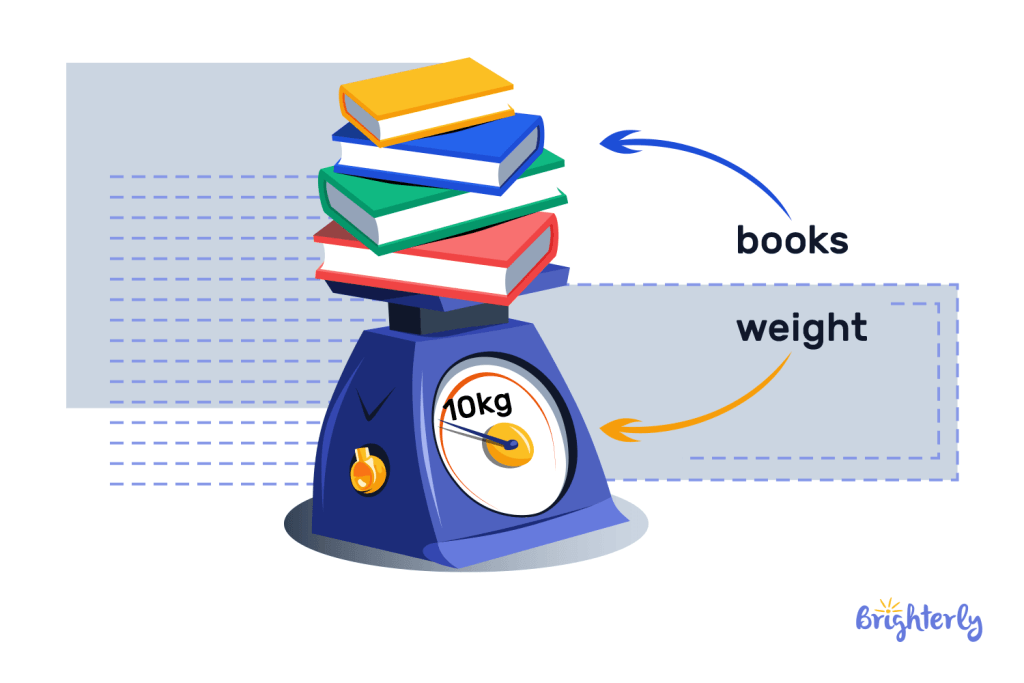
Example 2: A toddler that weighs 12kg

Example 3: A chicken weighing 2 kg
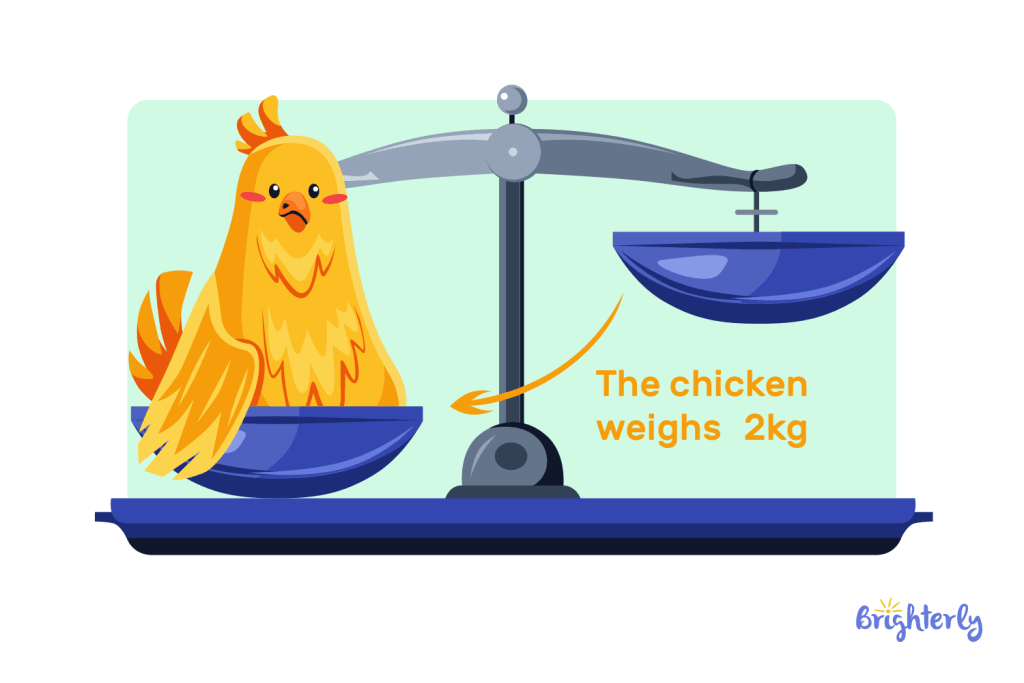
Example 4: A school backpack that weighs 1.5 kg

Example 5: A bag of groceries weighing 3 kg
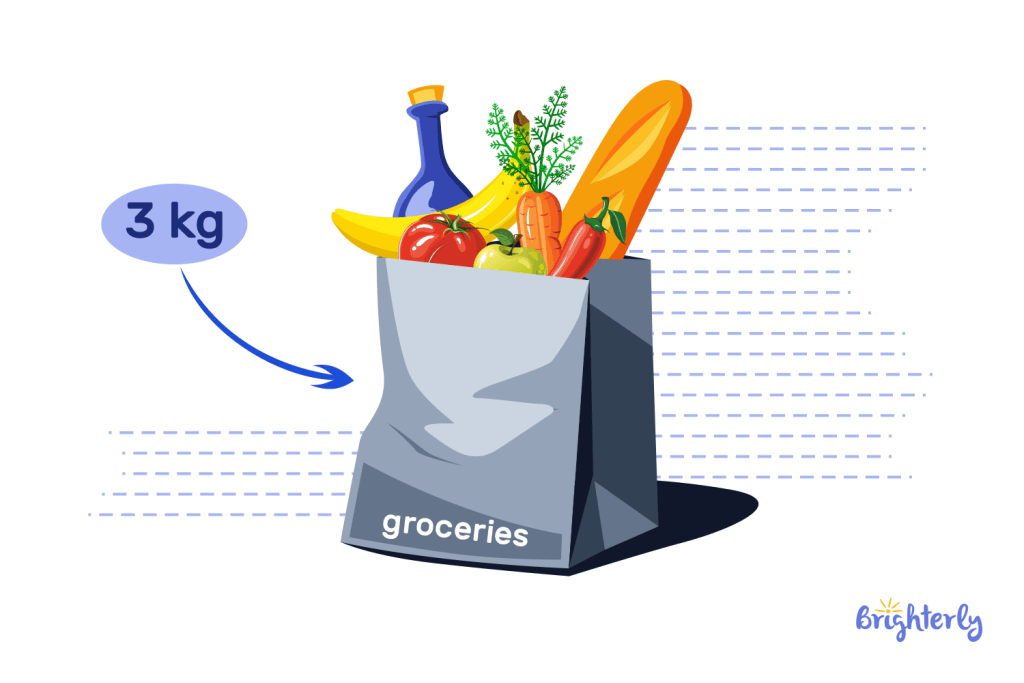
Kilogram Conversion
A metric prefix may be explained as a prompt preceding our unit of measurement (e.g., gram) to get another unit. To get other units, we add a metric prefix such as “kilo” which means 1,000.
However, note that the kilogram is the only SI base unit with the prefix as a part of its name. This is because of historical and practical reasons.
Kilogram to Gram
Gram (g) is used to measure small items such as a pencil or eraser but for heavier items such as a laptop, we use kilogram (kg). This is because a kilogram is a thousand grams.
Therefore, we can convert kilogram to gram by:
1kg = 1,000 g
Kilogram to Milligram
A milligram is to a gram what a gram is to a kilogram. This means that since a kilogram is 1,000 grams, 1 gram is 1,000 milligrams.
Therefore, we can convert kilograms to milligrams by:
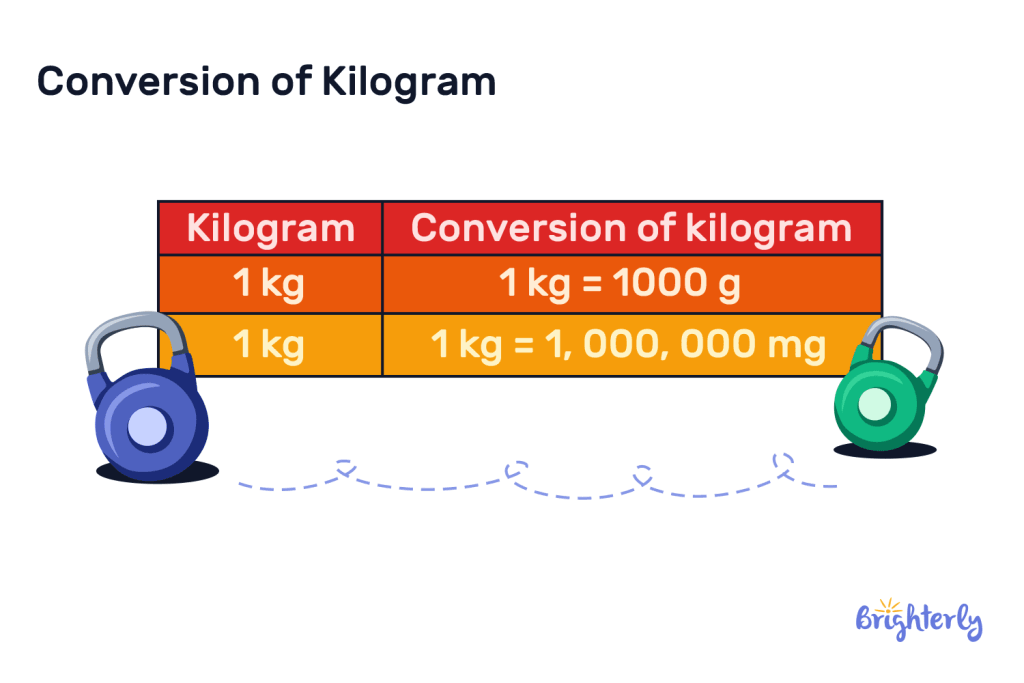
Conventional Units of Mass
There are different conventional units used to express mass in the United States. Some common ones are:
- Ounce
- Pound
- Ton
Conversion of Kilogram into US Customary Units
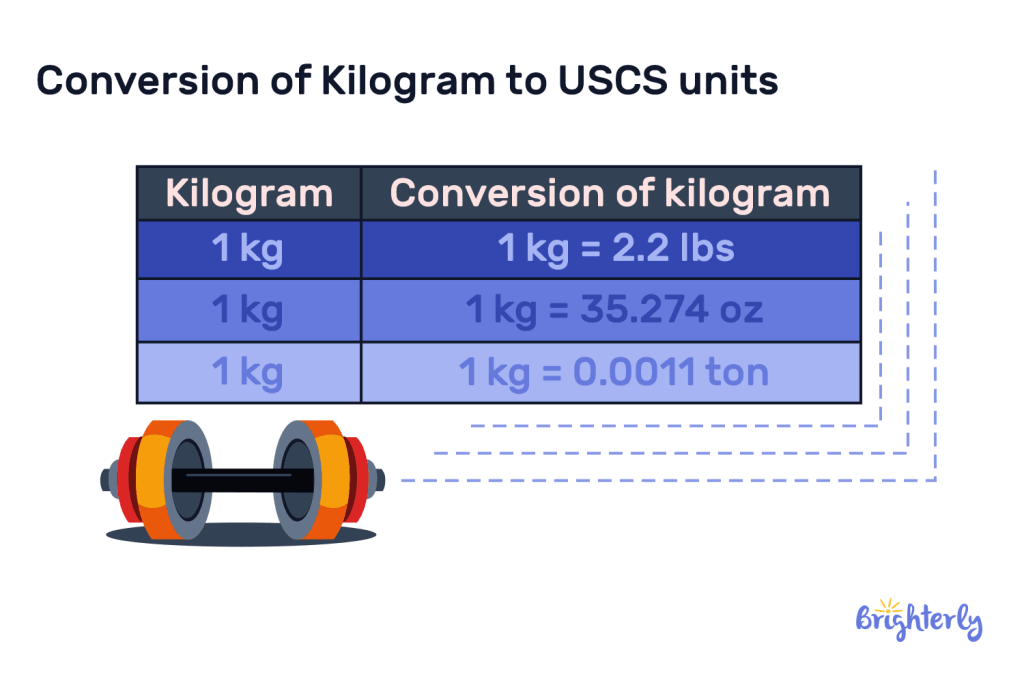
Now that we know the conversion from 1 kilogram to the US standard, we can find the reconversions to kilogram by dividing 1 by the conversions.
Kilogram to Ounce
1 kilogram (kg) is 35.27 ounces (oz) Therefore, 1 ounce is 1 ÷ 35.27 which is 0.028 kilograms (kg)
Kilogram to Pound
1 kilogram (kg) is 2.2 pounds (ibs) and 1 ib is 0.45 kg
Kilogram to Ton
1 kilogram is 0.00110231 ton and 1 US ton = 907.18 kilograms.
Things that Weigh 1 Kilogram
It is easy to find something that weighs a kilogram in your surroundings. There are household items that weigh a kilogram, classroom supplies, and even foodstuffs.
These are some objects that weigh 1 kilogram:
- A small bag of rice
- An inflated basketball
- A bicycle helmet
- A small hammer
- A grapefruit
How much is a kilogram?
1 Kilogram is the mass that makes the Planck constant 6.62607015×10- joule seconds– this definition was given by the General Conference on Weights and Measurements (CGPM) in 2019.
Previously, the kilogram was said to be the mass of 1 liter of water during the French Revolution of 1795.
In 1889, it was defined as the mass of a platinum-indium cylinder, a prototype kept at the International Bureau of Weights and Measurements (BIPM), Sevres, France.
How much does a kilo weigh?
A kilo weighs the same as a kilogram or 1,000 grams.
In 1866, the US Congress approved the use of “Kilo” as a legal alternative term for kilogram until the legal status of the word was rescinded in 1990.
However, a kilogram is still typically called a “kilo” in conversations and everyday use.
Solved Math Tasks: Examples
Solved math problem 1
Molly has a pony that weighs 420 pounds (ibs). How much does it weigh in kilograms (kg)?
Answer
We know that 1 pound (ib) = 0.45 kilograms (kg)
To get 420 pounds, we simply multiply 0.45 by 420;
0.45 × 420 ibs = 189kg
| Molly’s pony weighs around 189 kilograms. |
Solved math problem 2
Morty’s travel bag weighs 4 kg and he put inside it; a laptop (1 kg), a pair of shoes (800 g), a jacket (700 g), T-shirts (0.5kg), jean trousers (300 g), and a camera (700 g). What is the total weight of the travel bag?
Answer
To get the total weight, we need to add the weight of all the items plus the travel bag. Because some of the items are in grams, we can convert everything to grams, and then reconvert it to kilograms:
| Items | Grams |
| Travel Bag | 4000g |
| Laptop | 1000g |
| Pair of shoes | 800g |
| Jacket | 700g |
| T-shirts | 500g |
| Jean trousers | 300g |
| Camera | 700g |
| TOTAL | 8000g |
1,000 g = 1 kg.
| Therefore, the total weight of Morty’s travel bag is 8 kilograms. |
Solved math problem 3
When trick or treating, Bob and his friends were given candies. who has the most candies if Bob received 3.5 ibs, Joe received 0.0017 t, and Tim received 56 oz?
Answer
- Bob: 3.5 ibs
We know that 1 ib = 0.45 kg.
To convert 3.5 ibs to kg, we multiply 0.45 by 3.5
0.45 × 3.5 = 1.5 kg
- Joe: 0.0017t
When 1 t = 907.18 kg
To convert 0.0017 t to kg, we multiply 0.0017 by 907.18
0.0017× 907.18 = 1.5 kg
- Tim: 56 oz
When 1 oz = 0.028 kg
To convert 56 oz to kg, we multiply 56 by 0.028
56 × 0.028 = 1.5 kg
| Therefore, we can conclude that Bob and his friends received the same candy weight. |
Solved math problem 4
Anna’s pet dog weighs 15 ibs and she has a bag of rice that weighs 15 kg, which weighs more?
Answer
When 1ib = 0.45 kg,
15 ibs = 0.45 × 15
15 ibs = 6.75 kg.
| Therefore, the bag of rice that weighs 15 kg is heavier than Anna’s pet dog which weighs 6.75 kg. |
Solved math problem 5
A small car weighs 1.5 tons. Express in grams.
Answer
To convert ton to gram, we would first convert it to kg and then to gram.
When 1 t = 907.18 kg
1.5 t = 1360.77 kg
1 kg = 1,000 g
1360.77 kg = 1,000 × 1360.77
1360.77 kg =1,360,770 g
| This means the car weighs 1,360,770 grams. |
Kilogram in Math: Practice Math Problems
Kilogram in Math: worksheets
Keep learning about kilograms and the metric system with Brighterly’s free worksheets.
- Metric conversion worksheet
- Measuring Units Worksheet
- Metric system worksheets
- Measuring liquid volume worksheets






